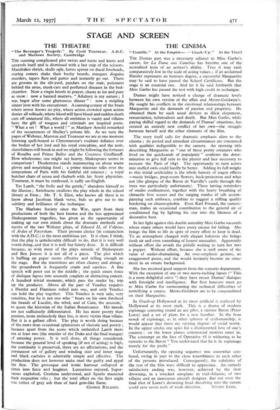THE CINEMA
"Camille." At the Empire—" Crack-Up." At the Tivon
THE Dumas part was a necessary adjunct to Miss Garbo's career, for La Dame aux Camilias has become one of the accredited tests of an actress's ability. True it may rank comparatively low in the scale of acting values ; if an acclaimed Hamlet represents an honours degree, a successful Marguerite may be said to have passed the School Certificate. But the stage is an essential one. And let it be said forthwith that Miss Garbo has passed the test with high credit in technique.
Dumas might have noticed a change of dramatic levels between his own version of the affair and Metro-Goldwyn's. He sought his conflicts in the emotional relationships between Marguerite and the demands of passion and propriety. He obtained them by such usual devices as illicit elopement, renunciation, tuberculosis and death. But Miss Garbo, while paying skilful regard to the demands of Dumas' situations, has created an entirely new conflict of her own—the struggle between herself and the other elements of the film.
The story itself calls for dramatic emphasis alien to the cinema ; its period and attendant circumstances are concerned with qualities indigestible to the camera. An opening title describing Marguerite as " one of those pretty creatures who lived on the quicksands of popularity " confirms the deter- mination to give full rein to the plaster and lace necessary to recreate the Paris of 1847. The opportunity to turn actors into stuffed owls could hardly be better. Adding its full weight to this initial artificiality is the whole battery of stagey effects —rustic bridges, prop-room flowers, back-projection and what not (the glimpse of the Baron de Varville's castle through the trees was particularly unfortunate). These jarring reminders of studio confinement, together with the heavy breathing of climactic love scenes and the surging rustles of silk accom- panying each embrace, combine to suggest a stifling quality bordering on claustrophobia. Even Karl Freund, the camera- man, makes an occasional contribution to the general air of conditioned fug by lighting his star into the likeness of a decorative bust.
In her fight against this double unreality Miss Garbo succeeds where many others would have every excuse for failing. She brings the film to life in spite of every effort to keep it dead. To an atmosphere charged with elegant haletosis she brings fresh air and even something of honest sensuality. Apparently without effort she avoids the pitfalls waiting to turn her into a puppet. Without effort, because she is well aware of the value of under-dramatising. An over-emphatic gesture, an exaggerated pause, and she would instantly become an orna- ment in an ornate background.
She has received good support from the scenario department. With the exception of one or two nerve-racking lapses (" This is a most delightful soirée ") they have recast Dumas' dialogue with foresight and intelligence. But first honours must go to Miss Garbo for surmounting the technical difficulties of revivifying a corpse. Metro-Goldwyn are to be congratulated on their Marguerite.
In Crack-up Hollywood at its most artificial is replaced by Hollywood at its most stark. This is a drama of modern espionage centering rourid an ace pilot, a sinister Baron (Peter Lorre) and a set of plans for a new bomber. In the beau monde of espionage, as in other spheres of craftsmanship, it would appear that there are varying degrees of social worth. In the upper circles one spies for a disinterested love of one's country : on the lower planes commercial motives enter in. The contempt on the face of Operative 78 is withering as he remarks to the Baron " You understand that he is in espionage merely for the profit."
Unfortunately, the opening sequence was somewhat con- fused, owing in part to the close resemblance to each other of the persons introduced. Consequently, the subtleties of the rest of the film were difficult to appreciate. An entirely satisfactory ending was, however, achieved by the slow drowning, in a wrecked aeroplane in mid-Atlantic, of two villains and an innocuous aircraft designer. But not even the final shot of Lorre's drowning head dissolving into the sunset
could save seven reels of weak direction. STUART LEGG.














































 Previous page
Previous page